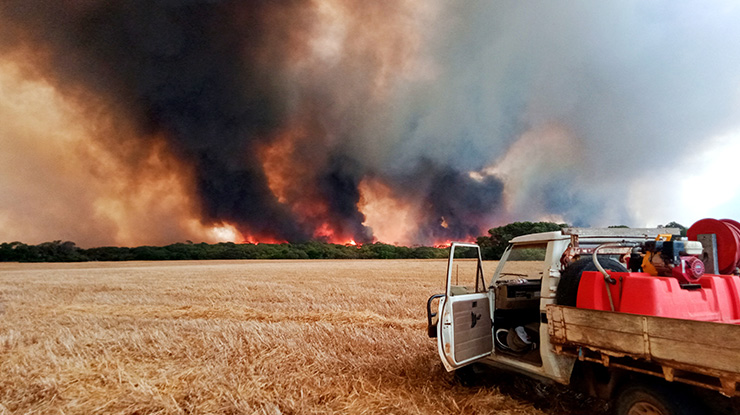Tips to prepare and recover from bushfires
22 October 2020
 Steve Morgan lost 15km of fence during the January 2020 Kangaroo Island bushfires. Image: Steve Morgan
Steve Morgan lost 15km of fence during the January 2020 Kangaroo Island bushfires. Image: Steve Morgan
Although the current seasonal outlook indicates a wetter, cooler summer than last year, following some simple steps now can help producers get back on track if an unpredicted fire event occurs.
Sheep producers Steve and Lucy Morgan from Vivonne Bay on Kangaroo Island, SA, are all too familiar with bushfires and know the value in being prepared.
They lost 15km of fencing and around 200ha of pasture during bushfires in January 2020, which compounded their fire damage from the year before.
“We lost a couple of kilometres of fencing and a little bit of pasture over the 2018–19 season, then earlier this year the impact was a lot worse,” Steve said.
“We were lucky as we didn’t lose any stock or infrastructure, even though nearly half of our home property was burnt.”
Getting back to business
After the fires, Steve saw an advertisement for MLA’s Back to Business program, which offered free consultation sessions for fire-affected regions. Through this, he worked with advisor Nic Kentish from Resource Consulting Services to get his business back on track.
The Morgans had worked with Nic in the past and when they saw his name on the list of consultants, they knew he was the right fit for their business.
“We thought it would be a great opportunity to have a fresh set of eyes to help with the recovery and offer new ideas on what we could do differently,” Steve said.
“The program helped us strengthen bushfire management and recovery plans, putting in more strategically placed waterpoints for our fire units and stock, and examining soil health in the burnt areas to get microbiology and growth back into it as soon as possible.”
Nic also provided Steve and Lucy with short, medium and long-term plans for their business to guide informed management decisions moving forward outside of bushfire planning and recovery.
“Nic’s been able to look beyond bushfires to give us a really strong plan of how we should be managing over the next few years,” Steve said.
Their plans include more rotational grazing in the summer, improved feed budgeting, water articulation and re-fencing to maximise infrastructure, such as raceways, and get the most out of their soils.
“Things like the re-fencing just go to show that even after fire damage, you can still find opportunities to improve or reinvent certain business aspects.”
Tips to prepare and recover from bushfires:Here, Steve and Nic draw on their experiences with bushfires to share their top tips for preparing and, if the worst happens, recovering. Preparation:
Recovery:
|


